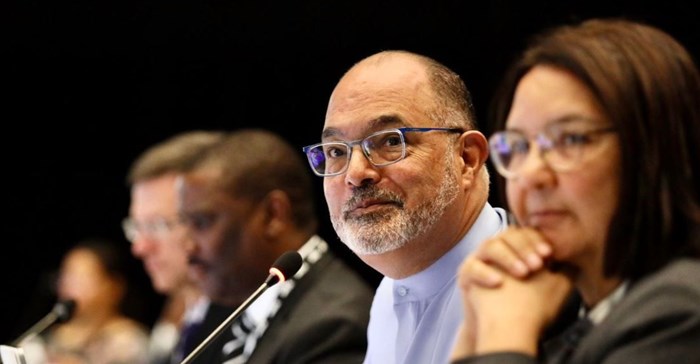A growing percentage of South African taxpayers are increasingly satisfied with the service provided by the South African Revenue Service (Sars).

Source: @Twitter/SARS Sars commissioner, Edward Kieswetter.
According to the recently published Taxing Times Survey for 2023 by PwC, 53% of respondents, when combined, expressed their agreement and strong agreement regarding the quality of service received from the revenue service. This marks a notable 14% improvement compared to the previous year.
This is the sixth annual instalment of the Taxing Times Survey which was conducted between May and July 2023. One-hundred-and-eighty-two corporate taxpayers participated from 16 industries including financial services, retail and consumer, agriculture, industrial manufacturing, and energy, utilities and mining.
The goal of the survey is to assess corporate taxpayers’ interactions with Sars, to identify the organisation’s strengths and to highlight the areas that require improvement.
Elle-Sarah Rossato, PwC SA tax controversy and dispute resolution partner, says: “There has never been a more critical time for us to assess how organisations and their tax functions are operating, responding to and coping with Sars audits, debt-collection processes, voluntary disclosure programme applications, and overall service delivery, given Sars’ drive to improve voluntary compliance and regain taxpayer trust.”
Advancements at Sars
Since the publication of our first report in 2018, the tax environment has significantly changed. Part of Sars’ restructuring included the appointment of three deputy commissioners this year. Among these developments are the deployment of resources — including the appointment of more staff and the use of technology to revive Sars — and advancements in the enforcement field.
Jadyne Devnarain, PwC SA tax controversy and dispute resolution associate director, says: “To cut down on the number of people who are obliged to file yearly income tax returns, Sars has expanded the implementation of automated assessments for personal-income taxpayers.
“It is firmly addressing defaulting taxpayers, and we have observed several media reports in which Sars notifies non-compliant taxpayers that they will face administrative penalties for submitting tax returns late.”
Key report findings
Our survey questions were designed to address Sars’ nine strategic objectives, which are crucial for both the organisation’s reconstruction and the successful and efficient collection of taxes. The survey also aims to serve as an assessment on how efficiently Sars is achieving its objectives.
Sars’ compliance with time periods: We asked participants if they believed that Sars honours time periods to get a general perception of taxpayers regarding Sars’ response time. Only 4% said they ‘strongly agree’ with the proposition that Sars complies with time periods — 2% better than what participants said in 2022.A combined 71% of participants said they ‘strongly disagree’ and ‘disagree’ that Sars honours their timelines. “This is an improvement from 2022’s 77%,” Rossato says. “Even though the results indicate an improvement, it appears that taxpayers still have a negative perception of their experience with Sars and its turnaround times.”
Likelihood of being selected for verification: When assessing corporate income tax (CIT), 53% of participants believe it is extremely likely that they will be selected for verification, compared to 47% in 2022. Time taken to finalise a verification process: Equivalent to last year’s results, 51% of participants said their CIT verifications take between one and three months to complete. Thirty-four percent of participants said their CIT verification takes between three and six months to finalise — a marginal improvement from last year’s 30% (2021: 29%). Therefore, within a six-month timeframe, 85% of verifications are completed.“Sars will most likely agree that this is too long, but seeing as a verification is a mere face-value and broad-level review of a return, verifications should be concluded swiftly,” Rossato says.
Time taken to finalise an audit: Nineteen percent of participants said a CIT audit is finalised within one to three months, which is a 5% improvement compared to 2022 (14%). An additional 3% of participants said their audits are finalised within three to six months.“A possible reason for the swifter finalisation of audits may be attributable to the interpretation notes and guides to assist taxpayers in correctly declaring their tax affairs, thereby avoiding protracted audit processes,” Devnarain explains.
“Another reason may be that Sars’ recruitment drive to employ specialist skills has yielded results.”
Vat verifications: Survey respondents indicated improved turnaround time for the finalisation of Vat verifications compared to previous years. Forty percent of participants said their verifications were completed within 21 days, a 4% increase from last year. Only 4% of participants said their verifications took more than 12 months to complete compared to last year’s 6%.Payment of Vat refunds: We asked participants about their experience regarding the timeframe in which Sars paid out refunds. Twenty-six percent said Sars released a refund within 21 days, while 18% said Sars did not make payment of refunds within 21 days, or only did after follow-up enquiries from taxpayers.Following the finance minister’s tabling of the Medium-Term Budget Policy Statement on 1 November, Sars said it has paid back R212.2bn to the economy through refunds for the first six months of the current fiscal year.
The revenue service said this figure is R24.6bn higher over the prior year and higher than the Budget 2023 estimate by R30.1bn. It also said that “like all other revenue agencies, impermissible and fraudulent refunds remain a concern this year,” and that Sars prevented R45bn from being paid out.
Other sentiments from participants included:Sars did not offer feedback after multiple attempts of communication.Challenges updating public-officer details on Sars’ efiling system.Sars respects timelines depending on the nature of the enquiry.Sars hardly ever adheres to deadlines, and when you call for a follow-up, agents are unaware of the proper deadlines or the requirements under the Tax Administration Act.Voluntary Disclosure Programme (VDP)
In August 2023, Sars published a “Guide to the Voluntary Disclosure Programme”. The VDP is a tool that enables taxpayers to ensure their historic tax records are accurate, and doesn’t only protect taxpayers from criminal investigation and certain penalties, but is also a valuable means of revenue collection.
“In April 2023, Sars had finalised 1,540 VDP applications which contributed to R3.5bn in revenue,” Devnarain says.
This year, 35% of participants said they had made use of the VDP process compared to the previous year’s 40%. This year, 27% of participants said Sars declined their application due to it not being ‘voluntary’ compared to last year’s 55%.
“This may be an indication of taxpayers’ improved understanding of the VDP legislation, for example, by ensuring that there are no audits on the relevant tax types, before commencing a VDP application,” Rossato says.
This year, 42% of respondents said their trust in Sars had increased (a decrease from 45% in 2022), while 58% (54% in 2022) said it had not. “This is a critical issue that Sars must address, as rebuilding trust will eventually translate into restored public confidence, increased tax morality and ultimately the payment of tax, which our country sorely needs to fulfil our fiscal budget,” Rossato concluded.









































